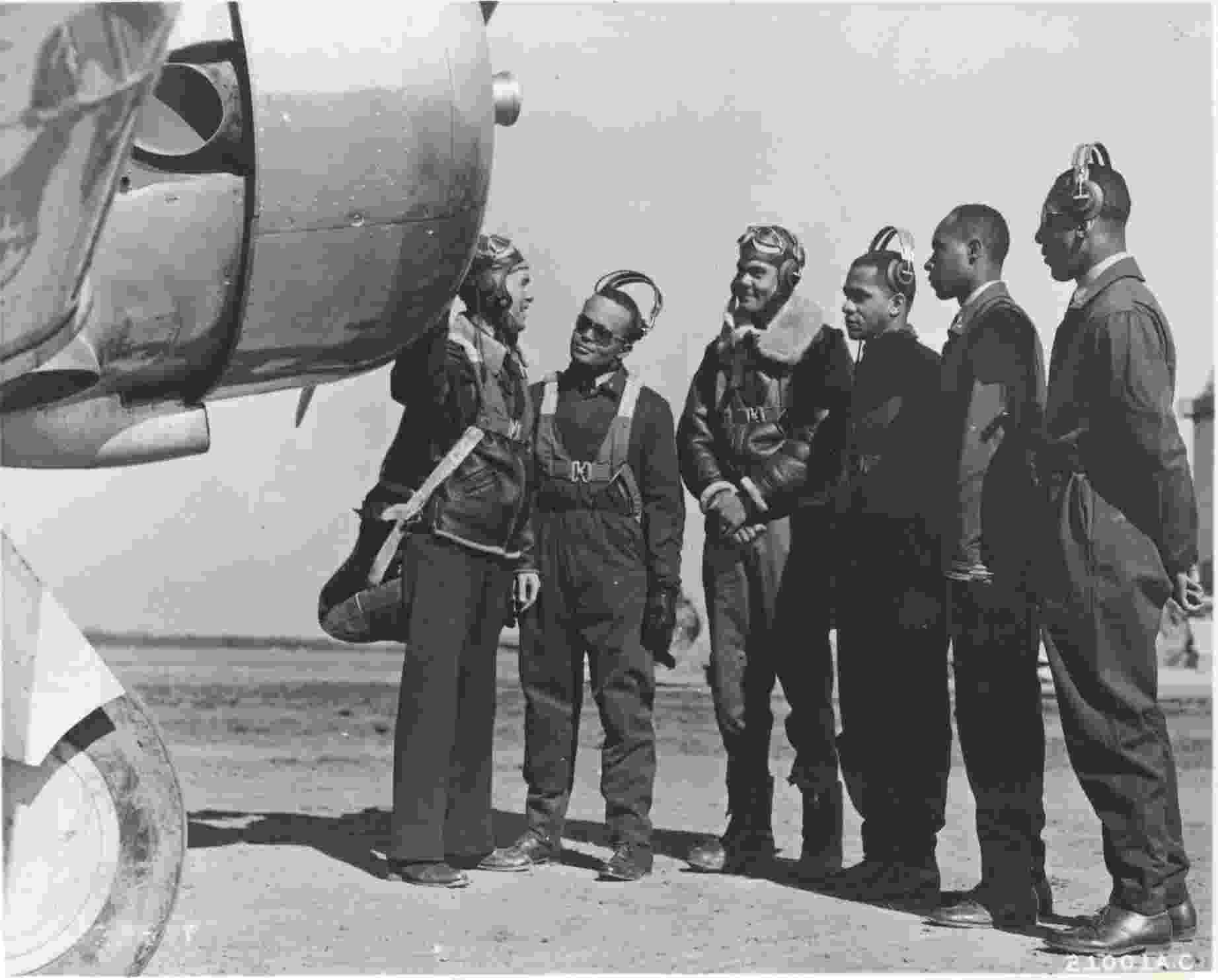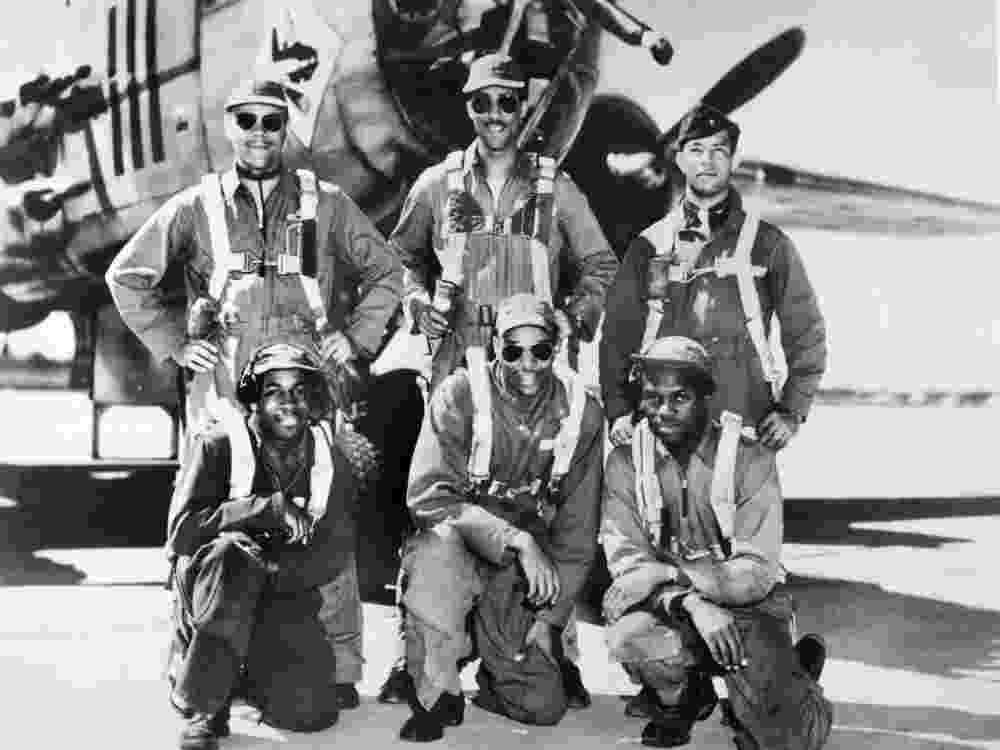Black History Month | Celebrating the Legacy and Accomplishments of the Tuskegee Airmen
Published 02-19-2024
18054

Black History Month | Celebrating the Legacy and Accomplishments of the Tuskegee Airmen
Black History Month serves as an annual celebration of the achievements, contributions, and rich heritage of African Americans throughout history. One group whose remarkable story stands as a testament to perseverance, courage, and excellence is the Tuskegee Airmen. During World War II, amidst the backdrop of racial segregation and discrimination, these trailblazing aviators shattered stereotypes and paved the way for future generations. This article aims to explore the significance of celebrating Black History Month by highlighting the extraordinary accomplishments of the Tuskegee Airmen, highlighting their resilience, bravery, and lasting impact on American society.
Background and Historical Context
According to the National Air and Space Museum, the Tuskegee Airmen were a group of African American pilots, navigators, bombardiers, maintenance and support staff, who served in the United States Army Air Forces (USAAF) during World War II. Named after the Tuskegee Army Air Field in Alabama, where they received their training, these men defied the prevailing racial prejudices of their time to become some of the most skilled and decorated aviators of the war.
Prior to World War II, racial segregation was deeply entrenched in the U.S. military, with African Americans largely relegated to menial roles and denied opportunities for advancement. However, mounting pressure from civil rights organizations and political leaders, coupled with the urgent need for work force during the war, led to the establishment of the Tuskegee Airmen program in 1941.
Despite facing discrimination and skepticism from some of their white counterparts, the Tuskegee Airmen proved themselves exceptionally capable and dedicated service members. Their accomplishments not only challenged the prevailing racial stereotypes but also played a pivotal role in the eventual desegregation of the U.S. military.
Accomplishments and Contributions
The accomplishments of the Tuskegee Airmen are many and encompass both their combat achievements and their broader impact on American society. One of their most significant contributions was their exceptional performance in combat missions over Europe and North Africa. Despite facing the dual challenges of enemy fire and racial prejudice, the Tuskegee Airmen distinguished themselves as skilled pilots and fierce warriors.
Escorting bombers deep into enemy territory, they demonstrated unparalleled courage and skill in the face of adversity. Their success in protecting Allied bombers from enemy fighters earned them widespread acclaim and the respect of their fellow service members. The Tuskegee Airmen's combat record, which included over 15,000 sorties and the destruction of numerous enemy aircraft, solidified their place in history as some of the most effective fighter pilots of World War II.
Moreover, the Tuskegee Airmen's achievements went beyond the battlefield, leaving an indelible mark on American society. By challenging racial barriers and proving themselves as equals on the battlefield, they helped pave the way for the eventual desegregation of the U.S. military in 1948. Their success served as a catalyst for broader social change, inspiring future generations of African Americans to pursue careers in aviation and other previously inaccessible fields.
Honoring the Memory of the Tuskegee Airmen
The legacy of the Tuskegee Airmen extends far beyond their wartime exploits, shaping the course of American history and inspiring countless individuals to overcome adversity and pursue their dreams. In the decades following World War II, many former Tuskegee Airmen went on to achieve remarkable success in various fields, including business, politics, and civil rights activism. Their perseverance and determination in the face of systemic racism served as a beacon of hope for African Americans striving for equality and justice. Their legacy continues to resonate today, reminding us of the importance of courage, resilience, and solidarity in the ongoing struggle for racial equality.

Celebrating Black History Month by honoring the accomplishments of the Tuskegee Airmen allows us to acknowledge the often-overlooked contributions of African Americans to the nation's history and reaffirm our commitment to justice and equality for all. Their story serves as a powerful reminder of the enduring power of the human spirit to overcome adversity and achieve greatness. The Tuskegee Airmen represent a shining example of courage, resilience, and excellence in the face of adversity. Their remarkable achievements during World War II not only helped secure victory for the Allies but also challenged racial stereotypes and paved the way for greater equality and opportunity in American society.
As we celebrate Black History Month, Literary Owls recognizes and honors the legacy of the Tuskegee Airmen Brigadier Generals Charles E. McGee and Enoch "Woody" Woodhouse, whose courage and sacrifice continue to inspire us to strive for a more just and inclusive world.
Brigadier General Charles E. McGee
One of the Tuskegee Airmen that fondly remembered by the National WWII Museum, in their January 16, 2022 blog article, is Brigadier General Charles E. McGee, who passed away on January 16, 2022, at the age of 102, at his residence in Bethesda, Maryland. McGee, recognized as a decorated combat pilot, served his country with distinction across three wars, embodying the values of dedication, perseverance, and service. As an African American navigating the segregated landscape of the US military, McGee confronted institutional racism and discrimination throughout his over 30 years of service. He leaves behind a lasting legacy characterized by his commitment to overcoming obstacles and his role as a selfless leader.
Born on December 7, 1919, in Cleveland, Ohio, McGee was influenced by his father, an African Methodist Episcopal minister, teacher, and World War I chaplain, who instilled in him a strong sense of character. McGee's upbringing emphasized hard work and education as pathways to opportunity. He embraced the principles of the Boy Scouts of America, earning the prestigious Eagle Scout Award in 1940 and recognizing the value of education as a means of preparation for seizing opportunities.
When the United States entered World War II, McGee, then an engineering student at the University of Illinois, enlisted in the US Army, driven by a profound sense of duty. Despite the pervasive segregation of the era, McGee and his fellow African American servicemen were resolute in their commitment to support their country's war effort. Graduating from the Tuskegee Institute's pioneering aviation program in 1943, McGee became one of the first African American pilots to fly combat missions for the US military.
Assigned to the 301st Fighter Squadron in Italy, McGee flew numerous combat missions, piloting various aircraft models and demonstrating exceptional skill and courage in the face of enemy opposition. His squadron, distinguished by the distinctive crimson paint on their aircraft's vertical stabilizers, earned the nickname "Red Tails" or "Red Tail Angels" for their exemplary performance as fighter escorts for Allied bombers.
McGee's military career continued beyond World War II, encompassing combat missions in both the Korean and Vietnam Wars. He amassed an impressive record of over 6,300 flying hours and earned numerous awards and decorations, including two Legion of Merit awards, the Distinguished Flying Cross, the Bronze Star, and the Air Medal with 25 oak leaf clusters.
Retiring from active duty in 1973 as a Colonel, McGee pursued his long-held goal of completing his college education, earning his degree from Columbia College in Kansas City in 1978. Throughout his life, he remained dedicated to sharing his experiences with future generations, receiving prestigious honors such as the Congressional Gold Medal in 2007 and induction into the National Aviation Hall of Fame in 2011.
Brigadier General Charles E. McGee's enduring legacy transcends his military accomplishments; it is defined by his unwavering commitment to excellence, perseverance, and service. His mantra of "Perceive, Prepare, Perform, and Persevere" encapsulates the ethos that guided his life and continues to inspire others. McGee's contributions to the advancement of civil rights and his exemplary leadership serve as a beacon of hope and a testament to the indomitable spirit of the human endeavor.
Brigadier General Enoch "Woody" Woodhouse
According to the Department of Defense, Brigadier General Enoch "Woody" Woodhouse, one of the last surviving Tuskegee Airmen, is a distinguished member of the Tuskegee Airmen who represents an integral part of Black history, especially during this Black History Month. Woodhouse's story is one of resilience, leadership, and trailblazing achievement in the face of adversity.
Born in 1919, Enoch Woodhouse grew up in a time when racial segregation was pervasive across American society. Despite facing significant challenges and discrimination, Woodhouse pursued his dreams with determination and courage. Woodhouse's journey with the Tuskegee Airmen began in the early 1940s when he enlisted in the United States Army Air Corps. Like many African Americans of his time, Woodhouse encountered racial barriers within the military. However, his commitment to serving his country and his passion for aviation propelled him forward.
As a member of the Tuskegee Airmen, Woodhouse underwent rigorous training at Tuskegee Army Air Field in Alabama, where he honed his skills as a pilot. Despite the racial prejudices and stereotypes surrounding African American aviators at the time, Woodhouse and his fellow Airmen persevered, proving their capabilities and earning their place in history. During World War II, Woodhouse distinguished himself as a skilled fighter pilot, flying combat missions over Europe and North Africa. Despite facing enemy fire and the additional burden of racism, Woodhouse and his comrades displayed exceptional bravery and professionalism in the face of adversity.
Woodhouse's contributions to the war effort were not only in the skies but also on the ground. As a leader within the Tuskegee Airmen, he inspired and mentored fellow pilots, fostering a sense of camaraderie and unity among the group. Following the war, Woodhouse continued to serve in the military, rising through the ranks and breaking down barriers for future generations of African American servicemen and women. His leadership and dedication paved the way for greater opportunities and equality within the armed forces.
Throughout his life, Woodhouse remained a steadfast advocate for civil rights and equal opportunity. His legacy as a Tuskegee Airman and a pioneer in the struggle for racial equality is a testament to the resilience and courage of African Americans throughout history. During Black History Month and beyond, it is essential to remember and honor trailblazers like Brigadier General Enoch "Woody" Woodhouse, whose contributions have left an indelible mark on American history and inspired generations to come.
Trust Literary Owls with Your History Essays and Research
As a history buffs and college student, you may at times feel overwhelmed by your history essays and research assignments. If that is the case, say hello to your new best friend in academia: Literary Owls. Yep, you heard that right. These wise and scholarly creatures are here to help you ace your history papers with excellence.
Why you should trust Literary Owls with your history essays and research this Black History Month?
We provide expert guidance for Black History Month essays and research
Black History Month is the perfect time to explore the rich and diverse domain of African American history. However, with so much ground to cover, where do you even begin? That is where Literary Owls swoop in to save the day. With their expertise in historical research and analysis, they will help you navigate the complexities of Black history with ease. Whether you are exploring the civil rights movement, the Harlem Renaissance, or the legacy of prominent figures like Martin Luther King Jr. and Rosa Parks, Literary Owls have your back.
We are experts in unlocking the secrets of history research
Literary Owls understands that history research can be a daunting task. It is easy to feel lost in a sea of information, from deciphering primary sources to creating compelling arguments. However, Literary Owls’ night owls are here to guide you through the murky waters of historical inquiry. With their keen research skills and meticulous attention to detail, they will help you uncover hidden gems and unearth the stories that bring history to life. So, whether you are poring over dusty archives or scouring digital databases, trust Literary Owls to light the way.
We write excellent history essays
It is often the case for college students to dread history essays and research but, the very existence of Literary Owls is anchored on turning essay-writing woes into triumphs. With their knack for writing compelling narratives and persuasive arguments, our night owls will help you transform your ideas into polished prose. It does not matter if you are tackling a thesis statement, organizing your thoughts, or polishing your prose: Literary Owls will be your trusty companions every step of the way.
FAQs
Are any of the original Tuskegee Airmen still alive?
As of 2023, there are approximately 3 surviving Tuskegee Airmen. Charles E. McGee, the eldest, reached 102 years old by December 7, 2021 before passing away in January 16, 2022.
How were the Tuskegee Airmen initially perceived?
At first, the Tuskegee Airmen faced doubts about their combat abilities compared to white pilots. However, they quickly disproved this notion and became one of WWII's most effective escort units.
What are the main achievements of the Tuskegee Airmen?
The Tuskegee Airmen, the first black military pilot group, are renowned for their WWII accomplishments and their role in desegregating the military.
Who comprised the Tuskegee Airmen?
This squadron was comprised of black pilots within the Army Air Corps, representing the first black pilots trained for military duty.
Why were they named Tuskegee Airmen?
Their training at Tuskegee Army Air Field in Alabama led to their moniker, the Tuskegee Airmen.
How successful were the Tuskegee Airmen?
Though quantifying "victories" is complex, the Tuskegee Airmen completed over 15,000 missions in WWII, damaging or destroying over 200 German planes, nearly 1,000 other vehicles, and a German destroyer.
Let Literary Owls do your history papers for you!
Trusting Literary Owls with your history essays and research is a no-brainer. The expertise, guidance, and unwavering support of our night owls will ensure that conquer even the most daunting of assignments with ease. This Black History Month, let Literary Owls be your partners in academic success. Reach us through our Live Chat (bottom-right), email ([email protected]) or Text/WhatsApp/Telegram (+1 (628) 201 7932).




